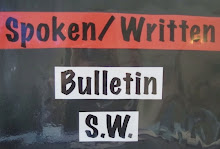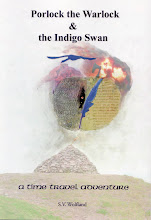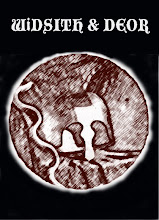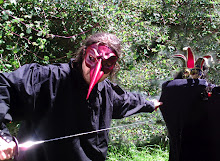It's no longer May, but then I've had a lot of things getting in the way of regular blog post paste ups! But here it is, a little later than planned.
It was great to be asked to be the guest performer at the Phoenix's monthly spoken word, music, comedy and variety extravaganza, 'Taking the Mic', by charming poet hosts the Festival Slam Winning Tim King, and Poetry Columnist for the Express & Echo, Morwenna Griffiths. I chose (as it seems to be going down really well with people) an extract from a sequence which I'm currently working on called 'The History of This House in 50 Objects', which charts the people who live in / drop in and out of / return to / interact with a place that is or becomes part artistic community, part eco-gypsy camp, and part inadvertent foster home to a whole range of folks. It deals with moments and happenings and glimpses of the past through the objects which they've left behind, intentionally or otherwise. The sequence seems to really interest people - after presenting a piece or pieces from it, I always get people coming up and thanking me or asking me if it's real, or saying they'd they'd like to see one of the objects etc.. It's a strange project to be working on, and in a way I'm definitely not 'writer material' and have the soul of a visual artist or performer - despite words being at the core of all I do - because I have (habitually) not wanted to write about people (!) thinking it rude and intrusive, especially without asking first. And, while not meaning to be 'precious' about it, have hated it when fellow writers have written me into plays or poems (always - from my own perspective at least - so ill drawn as if seen through a distorting mirror, or merely reflecting a point they wished to make that wasn't to do with the supposed 'original character'). And in '50 Objects' I face that problem. Of course none of this will be the way the protagonists see themselves - how could it be? Is it moral? Can it be right? (And why is it different to people writing a cliched / distorted image of the author?)
Well, I've thought long and hard, and come up with the following. Firstly, the people who have written things referring to others are often just friends, and mostly not close friends either. The people in '50 Objects' by contrast all lived together, sometimes cheek by jowl, they were - in the pre-C20th meaning of the word 'family' - a household, the people of the household, which is a distinctly different relationship with different ties and duties. Secondly, once you have suffered at someone's hands or on their behalf, I think it gives you more latitude over your shared past together. Thirdly, many won't remember and over half never read books, most never read poetry. So the chances of them coming across it to be offended are quite low. And those that do or might or who would mind? Those are the ones (I believe) who have least right to, being the ones who made it necessary to write as 'therapy' in the first place. A forfeited right, if you like, like a prisoner imprisoned for a crime and having no television perhaps. And then the names have been changed to protect people. And finally it has been 'fictionalised' to save the parallels being too obvious. In a way, also - the things left behind ultimately belong to whoever claims them. And the stories attach themselves to the things. I don't leave things about or with others for just those kinds of reasons. But if you have left all this stuff, then the duty of care for the material remains of the past passes out of your hands and into another's. And I am not claiming 'to truly know' all these people. Only describing their actions, their words, and sometimes their actions toward me. Is that right? I can only say that - after all that has happened, it feels justified, and in parts even just. I have been told that while depressing (!) in parts, that the portraits which it paints of the inmates are rounded, and that I always mention the positive sides / redeeming features etc. in each one. The things that explain their darker actions. And that is what I intend. No one is without virtue or good sides here, and I am not pretending to be without flaws either. The narrator in the text is an observer not a hanging judge. I have also been told not to have such scruples, and that that's 'just what writers do'. But I (who for preference have always written of colours, forms, landscape, structure, ideas, philosophy, politics, gardens etc., and then dialogues but between people I know well with their permission) hope that always when I do write of human relationships (and not just in a diary or journal or a fantasy/sci fi novel!) that it will be as ethical as I can make it.
On a less serious, or rather less soul-searching note! people have also called it (quite a few times now) 'inspirational', which is very kind. I am guessing this is to do with the Spinoza-ist style tiny 'democracy' in action from time to time, or the 'I am my brother's keeper' elements; also the 'let's all live together and make art' moments. (Even now I must write in an abstract way when writing about it, for all that it deals with emotions as some writers have dealt with every sordid detail in film noir novels). Anyway, people respond to it, and I keep writing more of it, so something feels right. 'The History of This House in Objects' is the history of a shared house, the house itself, the people who come and go, the things they leave or give, the tales that belong to the things. I guess it was writing about the objects themselves first that gave me the key, and the rest of it came pouring out once the floodgate was opened.
It was a good night, performing an extract from it at Taking the Mic as a guest. Many performers seemed to be on top form, so it was a really buzzy evening. The Stand Up Philosopher (rather appropriately) did a 'Best of All Possible Worlds' set by Leibniz! Which went with the theme of - what is this I have been given? How do I make the best of it? Jackie Juno and Jon Freeman's sets especially also seemed to go with the confessionals-as-art side of the theme, with some very moving and emotive work, so all in all in a strangely fitting combination/setting for '50 Objects'. Big thanks to all the other performers on the night, and huge thanks to Morwenna Griffiths and Tim King for asking me!
6 years ago





No comments:
Post a Comment